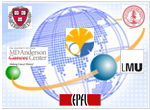
[The goal of research exchange]
The essence of vital phenomena is to regulate the structure and function of living materials, such as protein and nucleic acid. NanoBio is a research field aimed at materializing cutting-edge medical treatment by understanding such intravital mechanisms at a nanoscopic scale and creating nanodevices/nanomachines that can be applied in diagnosis, therapy, tissue fabrication, etc. In this field, it is necessary to call upon wisdom across the boundaries of traditional disciplines, including medicine, engineering, pharmacy, biology, and others. The fusion within these fields at a higher level yields novel achievements.
At the University of Tokyo, the Center for NanoBio Integration (CNBI) was founded in 2005 and the Center for Medical System Innovation (CMSI), a Global COE program, started in 2008, achieving the promotion of NanoBio research across the boundaries of medical, engineering, pharmaceutical fields; both researchers and students have always engaged in active cross-field exchanges. In this project, the activities are strongly globalized and partnerships are formed between institutes around the world which are undertaking advanced researches in NanoBio field, in order to build a network of international collaborative research and education which covers the entire range of NanoBio, from basic biological research to nanoimaging technology, nanoDDS (drug delivery system), and the development of cutting-edge medical devices. The key point of this project is furthering the current wealth of achievement in cooperative researches with overseas institutes and the enhancement of horizontal relationships across the world. By fostering many next-generation researchers and medical-care professionals who can transmit information internationally, it is hoped that the project will lead to the long-term evolution of the NanoBio field and the enhancement of the foundations for better global competitiveness in Japan.
[Outline of research exchange project]
| ① | Promotion of collaborative research In NanoBio research aiming at advanced medical care, the common goal is future medical care in which necessary diagnosis and treatment with minimal invasion are provided within the necessary time and place. The coordinators of this project in Japan have made significant achievements in international cooperative research: regeneration medicine (by Tei and Takato at Harvard Medical School), nano-imaging (by Urano at EPF Lausanne), nano-DDS (by Kataoka at Ludwig Maximilian University of Munich), and so on. Through the active exchange of researchers and students, this project develops such cooperative research and constructs a global framework to horizontally share and mutually exploit the results. |
| ② | Distribution of research results With the objective of ① mentioned above in mind, joint symposiums are organized in Japan and overseas on a regular basis to share the results and exchange information. Through exchange visits by researchers, seminars are held in each institute as a means of sharing opinions on their research. |
| ③ | Fostering next-generation human resources with an international perspective Human resource development for next generation is an important mission of this project. For the promotion of advanced medical care via NanoBio research, it is essential to cultivate researchers with an international perspective and medical doctors and professionals who profoundly understand the research and connect it to clinical applications. Professionals who have a good knowledge of medical legislation, patents, and commercialization in each country are also needed to realize medical application. This project includes long-term stays as part of research exchanges to conduct cooperative work, exchange visits for one or two weeks by the group of young researchers to institutes or hospitals, organizing workshops there, and internships in global companies related to NanoBio. Participants enhance their ability to perform a research always with the output of their results in mind. |


